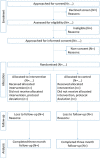Improving distress in dialysis (iDiD): a feasibility two-arm parallel randomised controlled trial of an online cognitive behavioural therapy intervention with and without therapist-led telephone support for psychological distress in patients undergoing haemodialysis
- PMID: 27072573
- PMCID: PMC4838682
- DOI: 10.1136/bmjopen-2016-011286
Improving distress in dialysis (iDiD): a feasibility two-arm parallel randomised controlled trial of an online cognitive behavioural therapy intervention with and without therapist-led telephone support for psychological distress in patients undergoing haemodialysis
Abstract
Introduction: Psychological distress is common in end-stage kidney disease (ESKD) and is associated with poorer health outcomes. Cognitive behavioural therapy (CBT) is recommended in UK clinical guidelines for the management of depression in people with long-term conditions. Access to skilled therapists competent in managing the competing mental and physical health demands of ESKD is limited. Online CBT treatments tailored to the needs of the ESKD population offers a pragmatic solution for under-resourced services. This study examines the feasibility and acceptability of implementing a two-arm parallel randomised controlled trial of online CBT with (intervention arm) and without (control arm) therapist support to improve psychological distress in patients undergoing haemodialysis.
Methods: Patients will be screened for depression and anxiety while attending for their haemodialysis treatments. We aim to recruit 60 adult patients undergoing haemodialysis who meet criteria for mild to moderately severe symptoms of depression and/or anxiety. Patients will be randomised individually (using a 1:1 computerised sequence ratio) to either online CBT with therapist telephone support (intervention arm), or online CBT with no therapist (control arm). Outcomes include feasibility and acceptability descriptive data on rates of recruitment, randomisation, retention and treatment adherence. Self-report outcomes include measures of depression (Patient Health Questionnaire-9), anxiety (Generalised Anxiety Disorder-7), quality of life (Euro-QoL), service use (client service receipt inventory) and illness cognitions (brief illness perception questionnaire). A qualitative process evaluation will also be conducted. The statistician will be blinded to treatment allocation.
Ethics and dissemination: A National Health Service (NHS) research ethics committee approved the study. Data from this study will provide essential information for the design and testing of further interventions to ameliorate distress in patients undergoing dialysis. Any amendments to the protocol will be submitted to the NHS committee and study sponsor.
Trial registration number: NCT023528702; Pre-results.
Keywords: STATISTICS & RESEARCH METHODS.
Published by the BMJ Publishing Group Limited. For permission to use (where not already granted under a licence) please go to http://www.bmj.com/company/products-services/rights-and-licensing/
Figures
References
-
- Care NK. Kidney disease: key facts and figures. East Midlands Public Health Observatory; 2010:2015.
-
- National Institute for Clinical Excellence. Guidance on home compared with hospital haemodialysis for patients with end-stage renal failure. National Institute for Clinical Excellence, 2002.
-
- National Institute for Health and Care Excellence. Chronic kidney disease (partial update): Early identification and management of chronic kidney disease in adults in primary and secondary care. London: National Clinical Guideline Centre, 2014. - PubMed
Publication types
MeSH terms
LinkOut - more resources
Full Text Sources
Other Literature Sources
Medical


